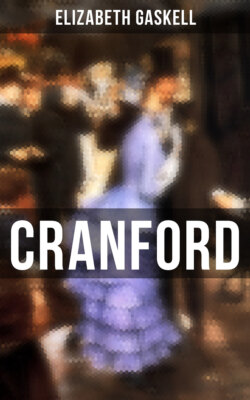Cranford

Реклама. ООО «ЛитРес», ИНН: 7719571260.
Оглавление
Элизабет Гаскелл. Cranford
Cranford
Reading suggestions
Table of Contents
Cranford
Chapter I. Our Society
Chapter II. The Captain
Chapter III. A Love Affair of Long Ago
Chapter IV. A Visit to an Old Bachelor
Chapter V. Old Letters
Chapter VI. Poor Peter
Chapter VII. Visiting
Chapter VIII “Your Ladyship”
Chapter IX. Signor Brunoni
Chapter X. The Panic
Chapter XI. Samuel Brown
Chapter XII. Engaged to be Married
Chapter XIII. Stopped Payment
Chapter XIV. Friends in Need
Chapter XV. A Happy Return
Chapter XVI. Peace to Cranford
Mrs. Gaskell and Knutsford. by George A. Payne
Preface
Preface to Second Edition
Introduction
Chapter I: Knutsford
Knutsford
Changes in Knutsford
The Bellman
The Rhymster
Is Knutsford the Original of "Cranford"?
Cranford Notes
Brook Street Chapel
Chapter II: Mrs. Gaskell
Biography and Criticism
Memorials of Mrs. Gaskell
Bibliography
Chapter III: The Rev. William Gaskell. M. A
The Rev. William Gaskell, M.A
Отрывок из книги
Elizabeth Gaskell
Mrs. Gaskell and Knutsford by George A. Payne
.....
After this second funeral, Miss Jenkyns insisted that Miss Jessie should come to stay with her rather than go back to the desolate house, which, in fact, we learned from Miss Jessie, must now be given up, as she had not wherewithal to maintain it. She had something above twenty pounds a year, besides the interest of the money for which the furniture would sell; but she could not live upon that: and so we talked over her qualifications for earning money.
“I can sew neatly,” said she, “and I like nursing. I think, too, I could manage a house, if any one would try me as housekeeper; or I would go into a shop as saleswoman, if they would have patience with me at first.”
.....